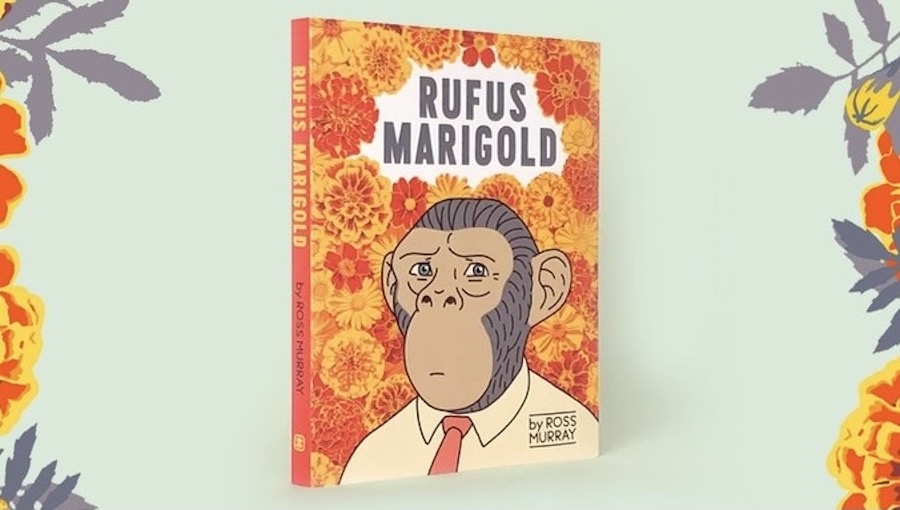Rufus Marigold is an extremely nervous guy. The ring of a telephone causes him to freeze in terror. Encountering a friend on the street is a crippling minefield of small talk. Giving a presentation at work is an impossible task that must be avoided by any means possible. Everyday life for Rufus is a harrowing obstacle course of anxiety, self-doubt, and avoidance. If any of this sounds familiar, you, like the author of Rufus Marigold, Ross Murray, likely have some experience with anxiety. And in the wake of the COVID pandemic, Rufus Marigold is more relatable than ever.
The first thing the reader notices is that Murray depicts his main character as a chimpanzee living in a world that is mostly populated by humans. This, of course, immediately establishes Rufus’ feeling of separation from world at large. His connection to the world outside of his head is almost nonexistent. Inside his head, though, he is entirely caught up in the social anxiety that dictates his every thought and action (or, in most cases, inaction).
Murray depicts Rufus’ world with similar deliberation. The comic’s layout is repetitive, which might sound like a negative comment, but very much is not. Each page has four equally sized panels and each section has four pages. This monotonous visual pacing builds up a feeling of tedium and entrapment, cueing the audience that we, along with Rufus, are caught in a cage of unmanageable experiences. The external world and Rufus’ anxiety are in control.
Murray’s depiction of this soul-destroying cycle doesn’t shy away from any of the devastating effects this mental health issue has in Rufus’ life. The churning whirlpool of negative thoughts permeates everything he does. Every social interaction, no matter how benign, is seen only through a lens of anxiety-fueled paranoia. Compliments require lengthy dissection in search of hidden meanings. Casual greetings are enemies. He believes, paradoxically, that all eyes are on him while at the same time that he is being completely ignored.

It isn’t a stretch to say that Rufus doesn’t cope with his disorder very well. He relies on alcohol, avoidance, and dishonesty to escape from the chaos of his mind. With his anxiety serving in place of actual social skills, he frequently treats others badly. The internal refrain, “I hate myself! I hate myself!” is directly followed by, “I hate people! I hate people!”
Thankfully, he starts to try tentatively reaching out through artistic expression and research. As he attempts to understand his disorder better and communicate what he is feeling to the world at large, he begins to find a measure of functionality. Through all of this, Rufus feels very real and relatable. Murray doesn’t lead his main character out into the sunshine of a traditionally happy ending. There is no miracle cure, just a glimmer of stability around the corner.
Towards the end of the comic, Murray, through Rufus, asks the question, “So, how am I supposed to know which of my miserable experiences are interesting or compelling enough to turn into a comic strip? Where do I draw the line?” His answer is to speculate that he has perhaps poured too much anxiety into the strip. My answer is that there can never be too much sharing about such a universally human topic. Rufus is not alone. His audience is with him from the first page to the last.
Footnote: Rufus Marigold started out as a web comic on Tumblr in 2016, was subsequently published in New Zealand by Earth’s End Publishing, and is currently being offered internationally through a Kickstarter campaign from Honest Publishing.
Creative Team: Ross Murray (writer/artist)
Publisher: Honest Publishing
Click here to purchase.

